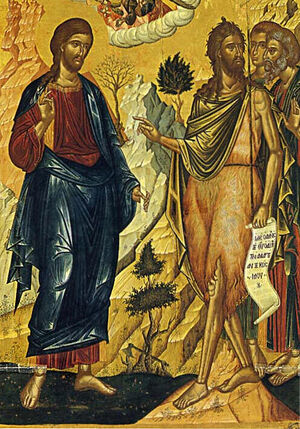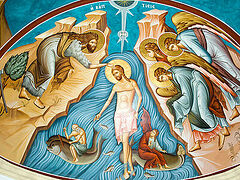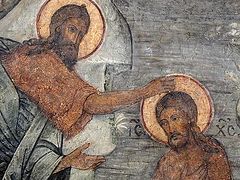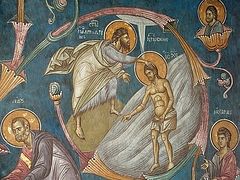 Photo: jesus-portal.ru The beginning of the Gospel of Jesus Christ, the Son of God; As it is written in the prophets, Behold, I send my messenger before thy face, which shall prepare thy way before thee. The voice of one crying in the wilderness, Prepare ye the way of the Lord, make His paths straight. John did baptize in the wilderness, and preach the baptism of repentance for the remission of sins. And there went out unto him all the land of Judaea, and they of Jerusalem, and were all baptized of him in the river of Jordan, confessing their sins. And John was clothed with camel's hair, and with a girdle of a skin about his loins; and he did eat locusts and wild honey; And preached, saying, There cometh one mightier than I after me, the latchet of whose shoes I am not worthy to stoop down and unloose. I indeed have baptized you with water: but He shall baptize you with the Holy Ghost (Mk. 1:1-8).
Photo: jesus-portal.ru The beginning of the Gospel of Jesus Christ, the Son of God; As it is written in the prophets, Behold, I send my messenger before thy face, which shall prepare thy way before thee. The voice of one crying in the wilderness, Prepare ye the way of the Lord, make His paths straight. John did baptize in the wilderness, and preach the baptism of repentance for the remission of sins. And there went out unto him all the land of Judaea, and they of Jerusalem, and were all baptized of him in the river of Jordan, confessing their sins. And John was clothed with camel's hair, and with a girdle of a skin about his loins; and he did eat locusts and wild honey; And preached, saying, There cometh one mightier than I after me, the latchet of whose shoes I am not worthy to stoop down and unloose. I indeed have baptized you with water: but He shall baptize you with the Holy Ghost (Mk. 1:1-8).
On the Sunday before Theophany, before we enter upon the feast on the waters, where the mystery of the Most Holy Trinity is revealed, the holy Church reminds us how we should prepare for this day. We hear the Gospel of Mark, with its very first words: The beginning of the Gospel of Jesus Christ.
The Holy Fathers draw our attention to the fact that all four Gospels begin from different starting points. The beginning of the Gospel of John: In the beginning was the Word … and the Word was God—this is what we hear on the Lord’s Pascha. This Gospel begins from eternity. The beginning of the Gospel of Matthew is the genealogy of the Lord Jesus Christ, from Abraham, who was the father of the faithful, and his children. The beginning of the Gospel of Luke is the Nativity of Christ. We hear about the birth of the greatest of those born among women, and about the birth of God, Who became man. And the beginning of the Gospel of Mark is the Baptism of the Lord. Having become man, God reveals the perfection of man. And in Baptism, every one of us becomes like Christ by His gift.
And where is the beginning of the Gospel for us? For the believer, the Gospel begins where Christ enters into his mind and heart by His grace. We learn that there is eternal life, there is a true God Who has become man. All the mysteries of our salvation are recorded in the four Gospels and revealed to us when we partake by grace of the mystery of our birth by water and the Spirit.
As says the Prophet Malachi: Behold, I will send My messenger [angel—Trans.], and he shall prepare the way before Me (3:1). St. John the Forerunner is called an angel because he, the greatest of those born among women, was “vouchsafed to touch the head of the Creator of the world,” and was the first of men to see the appearance of God the Most Holy Trinity in holy Baptism. He is called an angel because he is the first of men to show what God can do with man—restore him to immortal, Heavenly, angelic dignity.
He is called an angel, the Holy Fathers say, because he shows obedience to God and humility to the highest degree in his life. In this is the secret of the angels and of every man. St. John was chosen before his birth. Even in his mother’s womb he was filled with the Holy Spirit, being prepared for his extraordinary ministry—to be the forerunner of God Himself, Who appeared on earth. Knowing through the Holy Spirit of his high calling , he retreats to the desert, performing a podvig of prayer, obedience, and humility there for many years before reappearing to preach repentance to the entire world. He is an angel because he is free from all things earthly, from what people typically seek. Like an angel, he sees the inner man, the very essence of his soul. He doesn’t look at man’s flesh, which conceals the soul, but sees through to man’s very depths and appeals to this depth. He knows by his thirty years of laboring in prayer in the desert that all that exists in the world is from God. Everything that people give one another, they take from God. Therefore, he is entirely directed to God. He has no fear, for he knows that no one can do anything on earth if God doesn’t allow it for His own good purpose.
The Forerunner speaks about the fulfillment of prophecy: The voice of one crying in the wilderness, Prepare ye the way of the Lord, make His paths straight. What is the “wilderness?” The people come out to the Forerunner in the desert to confess their sins. But there’s a bigger point here. These are human souls who don’t have God. The wilderness is all of mankind, dried up from its sins, like the earth deprived of even a drop of moisture.
Why was St. John’s preaching so effective, inspiring crowds to come out to hear him and receive his baptism, which was but a shadow of that which is being celebrated in the coming days? Let us try as best we can to learn from the greatest of those born among women two essential things that defined his ministry. He was a man who truly loved God and lived the good news of salvation. Not only his words, but his entire life was a denunciation of the life of his contemporaries. The desert where he lived, his clothes made of camel’s hair, the leather girdle about his loins (those who have soft clothes live in palaces, says Christ), and the food of the poorest of the poor—locusts and wild honey—all of this testifies to his great simplicity and his participation in the sufferings of the people, their poverty.
It’s not about meaningless external imitation, as he himself teaches, but that the people’s pain and wounds would become our personal pain and our personal wounds. About how the preaching of treasures in Heaven is impossible for those who think about how to collect treasure on earth. And words about the blessedness of the poor can’t reach anyone if they’re pronounced from a place of mental and bodily comfort.
Immersion in the waters of the Jordan wasn’t a new rite—but the Forerunner gives it new meaning by his prophecy. However, the most important thing—and this is the whole ministry of the Forerunner—is that he proclaims theOne to come after him, Who is in fact mightier than he. He is so much mightier that he considers himself unworthy to fulfill the service of a slave—to bend down and loosen the latchet of His shoes: I indeed have baptized you with water: but He shall baptize you with the Holy Ghost.
The Lord will show what His Baptism means. By water and Blood, flowing from His side pierced with a spear, by the water of the Holy Spirit, the fire of Pentecost. We priests also baptize with water today, but the Lord Who goes before every man, through death and Resurrection is every present in the midst of the Mysteries of the Church and baptizes all with the Holy Spirit. When we pronounce the terrible, holy words, Heaven is united with earth, God is united with man. But the acceptance of this gift by us and those who enter into the waters depends on how much all of us standing here are worthy of these words.




